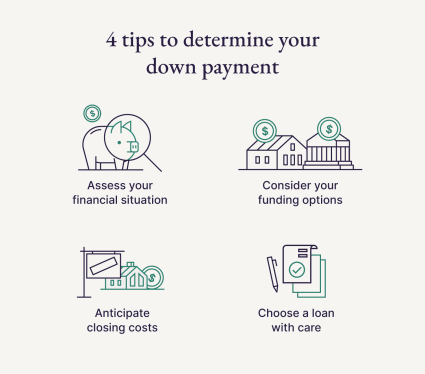How to use the down payment calculator
To use our house down payment calculator, you’ll need to pull together some financial data, enter it into the calculator and review your results. Here’s how to use the down payment calculator.Step 1: Gather home data
Assemble the financial information relevant to the home you want to purchase. Here’s what you need:- Home price: The total cost of the home you want to purchase.
- Down payment percentage: The percentage of the home price that you will pay upfront in cash.
- Interest rate: The annual cost of borrowing money from a lender as a percentage determines the amount of interest you will pay.
- Loan terms: The loan duration as determined by the National Association of Realtors, typically 15, 20 or 30 years.
- Closing costs: These are additional fees (on top of the listed home price) that you’ll pay during the finalization of the home purchase. They are typically a flat percentage of the home price.
Step 2: Enter your data into the calculator
Next, you’ll enter your data into the calculator. Double-check that you insert your information correctly since these inputs will affect your results. When you are ready to review your results, click “Calculate.”Step 3: Review your results
Once the calculations are complete, it’s time to see how much down payment you can afford for this home price.- Down payment: The amount you’ll need in “cash” to afford a home at this price. It’s essentially what you need to be ready to pay upfront.
- Monthly payment: The amount you can expect to pay in monthly mortgage payments.
- Total home price: The total home price, including mortgage interest.
- Loan amount: The home price minus your down payment — equates to the amount of money you’ll need to borrow from a lender.
- Closing costs: The dollar amount you expect to pay in fees when closing on your new home.
How do I estimate a down payment manually?
| Simple formula:Home price x down payment percentage = down payment in cash |
- Obtain the home price: In this case, your target home price is $1,000,000.
- Confirm the down payment percentage: Find the necessary down payment percentage for the home purchase. Let’s assume it’s 20% (or “.2”) for this example.
- Plug your numbers into the equation: 1,000,000 x .2 = 200,000.
- Review your results: Your resulting down payment will be $200,000.
Down payment calculator example
Here’s an example of how the home down payment calculator works using a theoretical home listed at $500,000. Using the manual method above, you can estimate $100,000, but we’ve also broken down additional calculations below to paint the full picture and help you better evaluate.- Home price: $500,000
- Down payment percentage: 20%
- Interest rate: 5%
- Loan terms: 30 years
- Closing costs: 3%
| Result | Calculation example |
| Down payment: $100,000 | 500,000 x .2 = 100,000 |
| Monthly payment: $2,147 | (400,000 x ((0.05/12×(1+0.05/12)^360/(1+0.05/12)^360−1))/360)= 2,147.29 |
| Closing costs: $25,000 | 500,000 x .05 = 25,000 |
| Total home price: $773,024 | 2,147.29 x 360 = 773,024.4 |
| Loan amount: $400,000 | 500,000 - 100,000 = 400,000 |
Tips to figure out the right down payment amount for you

Assess your financial situation
Before embarking on the home buying process, review your financial situation. Take stock of the following factors that can influence your down payment amount:- Income and expenses: Evaluate your monthly income against essential expenses to determine how much you can comfortably afford.
- Credit score: A higher credit score may open doors to better mortgage terms, affecting your down payment requirements.
- Debt-to-Income ratio: Compare your debt-to-income ratio — a lower ratio can improve your borrowing capacity.
- Emergency fund: Establish a safety net for unexpected expenses to avoid compromising your down payment funds.
- Market conditions: Research current real estate market conditions to understand home price trends in the location of your ideal home.
- Future goals: Consider your long-term financial goals and how homeownership fits into your overall financial plan.
Consider your funding options
There are several ways to source the cash you need for a down payment. Here are a few funding options to consider:- Savings: Using savings avoids additional debt and may help with negotiations, as it demonstrates financial responsibility to lenders.
- Piggyback loans: This involves taking out a second loan, often a home equity loan or line of credit, to cover part of the down payment.
- Down payment assistance programs: These programs provide financial aid to eligible homebuyers, especially first-time buyers with limited financial resources.
- IRA (Individual Retirement Account): Some first-time homebuyers may qualify for penalty-free withdrawals (up to a certain limit) from their traditional IRA to fund a down payment.
- 401(k): Some individuals may consider borrowing from their 401(k) through a loan or a hardship withdrawal.
Anticipate closing costs
In general, closing costs are typically around 2% to 7% of the purchase price. Adding closing costs to your upfront payments can help you know how much you can afford as a down payment. If you don’t pay closing costs in cash upfront, they’ll roll into your mortgage and can affect your monthly payments and the amount of interest you pay during the duration of your loan.Choose a loan with care
While lenders are motivated to provide you with the highest possible loan amount due to interest incentives, it's important to note that qualifying for a large loan doesn't automatically mean it's in your best interest to accept the full amount.Saving for a higher down payment that reduces your loan amount may benefit your financial health in the long run. In terms of the length of a loan:- Longer loan lengths may create smaller monthly payments.
- Shorter loans generally mean you’re paying less in interest over time.
What to look at when calculating a second home down payment
When buying a second home, prospective homeowners can employ a few unique strategies to calculate their potential down payment:- Review your existing property's equity: If you already own a property, assessing its equity can provide a potential source for the down payment on your second home. Using this equity may reduce the need for a large cash down payment.
- Decide on the purpose of the second home: Knowing your intentions helps you tailor your approach to the down payment based on the property's use and potential future income. Lenders may have different requirements for an investment property or a vacation home.
- Consider your ownership type options: Exploring ownership types, such as joint ownership or forming a partnership, may open up new opportunities to pool together funding sources.
Down payment calculator FAQ
How much do I need for a down payment?
You can generally expect to pay around 20% of the home price as a down payment.
How does the down payment affect my mortgage or loan?
Lenders consider your down payment amount in the loan approval process. The amount you pay upfront can reduce your overall mortgage payment and the amount you pay in interest during the duration of your loan.
How much down payment for a $500,000 house?
If you will pay 20% of the home price as the down payment for a $500,000 house, you can expect to pay $100,000 in cash.
What is a good example of a down payment?
A good example of a down payment is when a homebuyer uses a percentage of the total home price, typically paid in cash, to secure the property. For instance, if a home is priced at $250,000 and the down payment requirement is 20%, the buyer would provide $50,000 upfront as the down payment.
What are some benefits of a larger down payment?
Paying a larger down payment means you will have a smaller loan amount. It can result in you paying less interest and having smaller mortgage payments.



